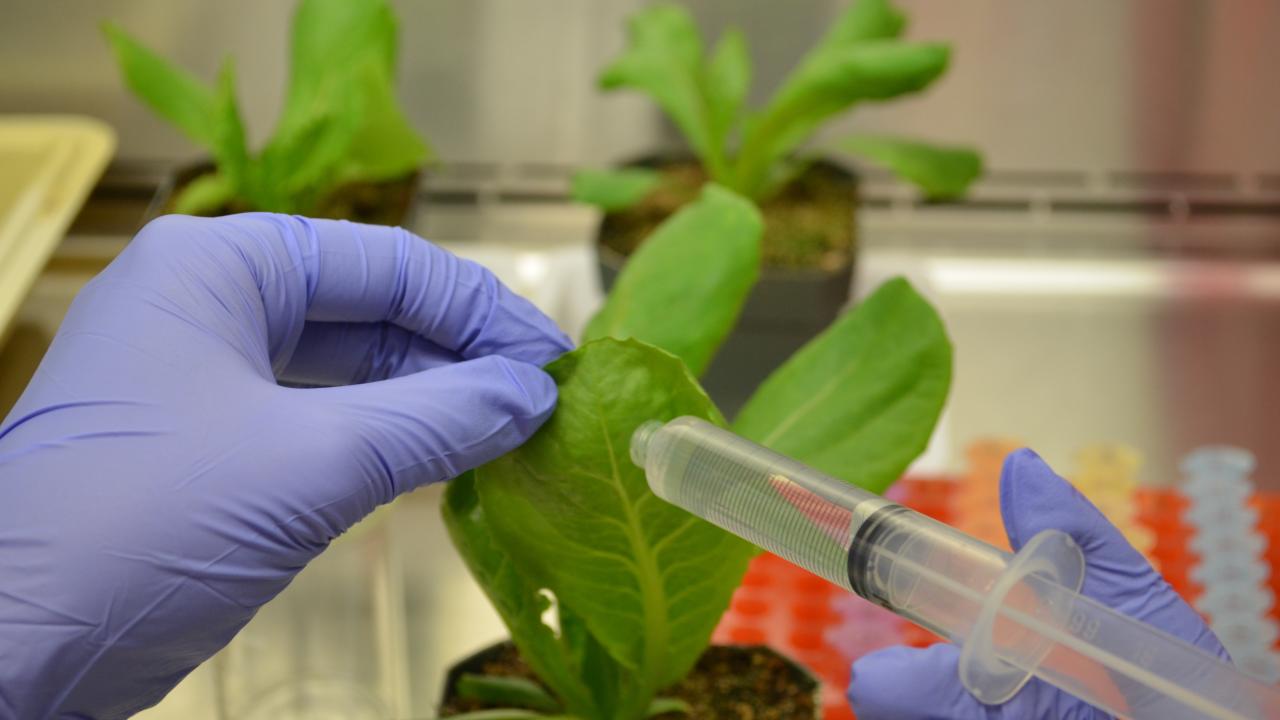The graduate program in Horticulture & Agronomy offers various degrees.
MS Plan I (Thesis)
- The MS Plan I requires a minimum of thirty (30) units of upper-division and graduate courses and a thesis. At least 12 of the 30 units must be in graduate courses in the chosen major field. Courses are selected with the advice and consent of the student's Major Professor, who serves as Chair of the Dissertation Committee, and by the student's Graduate Advisor. Major professors are nominated by the Graduate Advisor and officially appointed by the Graduate Dean. The thesis will be based on experimental research.
MS Plan II (Comprehensive Exam)
- The MS Plan II requires a minimum of thirty-six (36) units of upper-division and graduate course work and a comprehensive final examination. At least 18 of the 36 units must be earned in graduate courses in the major field; no more than 9 of these 18 may be in research (299) courses. The group requires a minimum of six units of original research, accompanied by a written report submitted to the Graduate Adviser. Courses are selected with the advice and consent of the student's Graduate Adviser. A faculty committee of three (3) is nominated by the Graduate Adviser and appointed by the Graduate Dean to administer the exam. More information regarding MS Plan II can be found here.
Ph.D
- The Ph.D. program is structured to meet the needs of a diverse student body whose unifying characteristic is an interest in the application of biological principles to the solution of problems in crop production and resource management. Two primary objectives of the curriculum are to foster a sense of community among the students and to provide them with a breadth of knowledge about agronomic and horticultural principles and how they are used in a variety of practices. Students will be aligned into one of five areas of emphasis - Agroecology, Crop Improvement, Crop Production Systems, Plant Physiology, and Post-harvest Biology/Physiology - and pursue projects in cropping systems.
Designated Emphasis in Biotechnology (DEB) Program
- The Designated Emphasis in Biotechnology Program is an intergraduate group program that allows Ph.D. students to receive and be credited for training in the area of biotechnology. The UC Davis Biotechnology Program is the administrative home for this program. The DEB brings together students and faculty from a wide array of STEM disciplines to create an educational ecosystem that promotes collaborative team science, effective science communication for diverse audiences, and an entrepreneurial mindset for tackling complex global challenges across human health, agriculture and the environment
Designated Emphasis in Viticulture and Enology
- The Designated Emphasis in Viticulture and Enology program creates a structured academic pathway for doctoral students conducting research in viticulture and enology at UC Davis. By building on the strengths of existing graduate groups, the DE fosters cross-disciplinary collaboration and ensures that students gain both depth and breadth in this specialized field.
- Graduate Academic Unit Certificated (GAUC) Program
- The Plant Breeding Center and the Horticulture and Agronomy Graduate Group developed a Graduate Academic Unit Certificate (GAUC) in Plant Breeding at UC Davis. The GAUC Program welcomes students from any graduate or professional degree program to apply. Applications will be accepted continuously and reviewed quarterly. A Graduate Academic Unit Certificate consists of a minimum of 12 units of graduate-level instruction and may use shared courses/units for another degree program. A GAUC cannot be granted until a student has completed the academic residence requirement (a minimum of three quarters with at least 4 registered units per quarter) at the University of California with a grade-point average of at least 3.0. The certificate of completion for a GAUC will bear the seal(s) or letterhead of the particular College(s) or School(s), but not the seal of the University of California, Davis
- Working in Industry
- The GGHA offers various opportunities for graduate students to connect with industry to gain practical experience and enhance their employability through industry-engaged research. There are three main pathways to engage with the industry, and it is often beneficial to participate in various programs that build relationships with industry mentors: Working in the industry while enrolled in GGHA, completing an internship while enrolled in GGHA and Mentorship by industry professionals.



